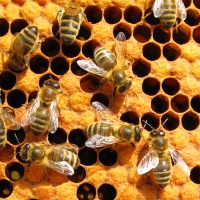Homeopathic Apis mellifica
From Health Facts
Latest Edit: Hector 2014-03-18 (EDT)
| See Also | Homeopathic Monographs |
|---|
Apis mellifica comes from a bee and the characteristics associated with this remedy are like a bee sting - burning, stinging, redness and swelling.[1]
Source
- Insect: Honeybee
- Short Form: Apis
Indications
The following are the main indications for Apis mellifica[2], [3]
- Insect bites especially bee stings or bites that are red and hot with stinging pain and a lot of swelling
- Allergic reactions especailly if associated with swelling and stinging pains
- Anaphylactic shock especially if associated with swelling and stinging pains
- Conjunctivitis (pinkeye) with redness of the eye and swelling around the eye
- Sore Throat with swelling of the uvula, pain is often stinging and may extend to the right ear, better with cold drinks
- Urinary Tract Infection with scalding urine, especially the last drops, constriction, urination is frequent and can be involuntary, feels as though the urine will not come out.
Other common conditions: hay fever, ear pain, hives, cystitis, pharyngitis
Characteristics
- General: red, hot, stinging pain, swelling
- Worse: heat, hot rooms, hot drinks, a hot bath, in bed
- Better: cold, cool air or cold applications, cold bath or shower, uncovering
- Psychological: busy people that are task oriented, protects others, jealous
- Other symptoms: hives, itching, swelling and puffiness of face and around the eyes, itchy skin
- Food and drink: not thirsty
Prescribing Considerations
Homeopathic remedies are prescribed based on homeopathic principles and after a detailed case taking. The prescription recommendations below are provided only as a guide. It is always recommended to consult with a naturopathic doctor or homeopathic practitioner prior to taking any homeopathic remedies, especially if your health is compromised or if your symptoms due to resolve in a timely fashion. The general recommendations for Aconite include:[4]
- with swelling lower potencies are recommended
- action may be slow, especially with urinary complaints
- Compare: Apium virus, Zinc, Cantharis, Vespa, Lachesis
- Natrum muriaticum is considered the chronic of Apis. Baryta carb is often used concurrently if lymphatics are involved.
References
- ↑ Morrison Roger (1993) Desktop Guide, to Keynote and Confirmatory Symptoms Hahnmann Clinic Publishing.
- ↑ Hershoff Asa (2000) Homeopathic Remedies, A Quick and Easy Guide to Common Disorders and their Homeopathic Treatments, Avery Publishing Group, New York.
- ↑ Ullman Robert, Reichenberg-Ullman Judyth (1997) Homeopathic Self-Care, the quick and easy guide for the whole family. Prima Publishing.
- ↑ Boericke W (1996) Pocket Manual of Hemoeopathic Materia Medica and Repertory, a Chapter on Rare and Uncommon Remedies, B. Jain Publishers, India.
